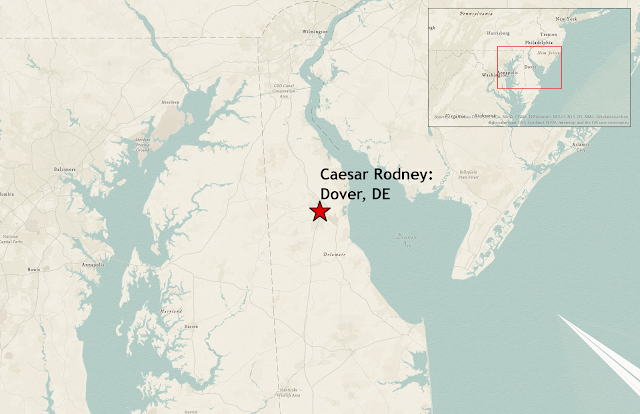Founding Fathers - Caesar Rodney
Caesar Rodney
Born: October 7, 1728 (Dover, DE)
Died: June 26, 1784 (Dover, DE)
Happy 2023, and welcome back to the Geographist blog! To kick off the new year, I wanted to start with someone who may not be well-known but who is certainly an important figure in our nation's history: Caesar Rodney. Born on an 800 acre farm to a successful family in Delaware, he was the oldest of two children and was named for his father. At the age of 14 Caesar was sent to nearby Philadelphia to study before his father died two years later. From that point on he was in charge of his family's estate, although he was for a time under the guardianship of Nicholas Ridgely, who was serving Delaware as a Supreme Court Justice. As he entered adulthood he embodied several contrasts. His studies had been interrupted and he was not considered one of the intellectual scholars that typically engaged in politics, but he was nevertheless widely regarded as possessing significant wit, humor, and political skill. He accomplished much in various pursuits, but despite several professions of love he was never able to be a successful suitor and remained unmarried throughout his life. He was reasonably well-known and respected, but because of a deformity caused by cancer he frequently covered part of his face and did not have many portraits, possibly affecting his notoriety in later years.
While still in his 20s, Caesar Rodney became involved in politics when he was elected sheriff of Kent County, a position which was both prestigious and lucrative. He was also involved in the French and Indian War as a commissioned captain of a militia unit known as the Dover Hundred, although they never saw battle during the conflict. After three years as sheriff he served in a number of rolls, both in the legislative assembly and in the legal courts. Despite the wealth he had obtained, Rodney became much more closely aligned with the political views of Delaware's country party than those of the more affluent court party that regularly sided with British interests. Even though his views were decidedly the minority opinion in his home county, Rodney was selected as a delegate to the Stamp Act Congress as well as the First Continental Congress. He shared correspondence with other delegates favoring independence and led the Assembly of Delaware, along with friend Thomas McKean, to vote for a severing of ties with Britain.
It was during the Second Continental Congress that Caesar Rodney made his mark on American history. He was forced away from the meeting in Philadelphia to assist the militia with a Loyalist riot in Delaware's Sussex County when the motion for independence was made. The other two delegates, McKean and George Read, were split their support and the success of the motion hung in the balance. Upon hearing the news, Rodney mounted his horse in a driving thunderstorm and raced the 80 miles back to Philadelphia. He arrived at the front steps of Independence Hall in time to cast his vote and break the deadlock, still unceremoniously wearing his boots and spurs from the over-night ride. Rodney's decision did not have widespread support among his constituents and he lost his subsequent election for the General Assembly.
No longer a delegate to the Continental Congress, Rodney intended to join the Continental Army as one of the few signers with a military background, but George Washington sent him back to Delaware to take a leadership role with the state militia. Eventually holding the rank of Major General, Rodney spent much of his time securing supplies for Washington and controlling uprisings by British sympathizers. After the nearby Battle of Brandywine resulted in a disaster for the Colonial Army, as well as the capture of Delaware's State President John McKinly (as their governor was then known), Rodney was selected to lead the state and immediately rejoined old friend Thomas McKean as a delegate to the Continental Congress. He served as president until bad health forced his resignation shortly after the Battle of Yorktown ended the war. Rodney was elected to Congress each of the next two years, but declining health prevented his participation. In 1783 he was elected to the state Legislative Council, which honored him by naming Rodney as the speaker and meeting in his home, but the cancer that had gnarled his appearance for years finally claimed him before the term was finished and he died at the age of 55. A statue commemorating his ride was placed in downtown Wilmington, DE, in 1923 and a likeness of that statue was later chosen for Delaware's state quarter - the first of the 50 State Quarters Program, originally released in 1999.
The signature of Caesar Rodney can be found as the tenth name on the fourth column beneath the Declaration of Independence.




Very interesting. I had heard of the ride, but didn't know who it was.
ReplyDelete